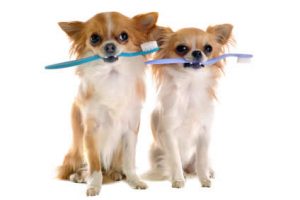Pet Dental Care
It is generally recognised that in veterinary practices, the majority of cats and dogs over three years old will have some degree of dental disease. Over time, debris and bacteria build up on the teeth to form plaque which, if not removed, will become mineralised to the hardened substance known as tartar, or dental calculus.
 This in turn, can cause inflammation of the gums know as gingivitis, and may lead to periodontitis which can cause loosening of the teeth in their sockets. Ultimately dental disease can leave pets with sore, smelly and painful mouths, and cause them to be very unwell.
This in turn, can cause inflammation of the gums know as gingivitis, and may lead to periodontitis which can cause loosening of the teeth in their sockets. Ultimately dental disease can leave pets with sore, smelly and painful mouths, and cause them to be very unwell.
In some cats there is a genetic weakness in the tooth enamel that leads to painful erosive lesions on that can lead to the crowns breaking away exposing the nerve and root. These teeth require extracting to remove the source of pain.
It is well known that plaque can begin to build up on the surfaces of the teeth very quickly after a dental has been performed and that tooth brushing, in conjunction with other measures, is the most effective way of minimising this accumulation.
Pets should be introduced to brushing slowly, using a soft pet toothbrush and specially formulated toothpaste.
The toothbrush should be used in small gentle circular movements in the area where the tooth meets the gum.
It is known that plaque can start to build up on the tooth surfaces very quickly even after a dental has been performed, and tooth brushing is the most effective way of minimising the accumulation of dental deposits.
Pets should be introduced to this process slowly, using a soft toothbrush, and toothpaste formulated especially for pets.
The toothbrush should be used in a gentle circular motion around the area where the tooth meets the gum.
Summary for good dental hygiene
- Have your pets’ teeth properly cleaned
- Feed dry food exclusively – no tinned or other processed foods and no adding water to dry food
- Provide specific dental chews but not too often as these can cause weight gain
- Brush regularly if possible
- Check your pets’ teeth on a weekly basis

